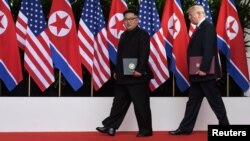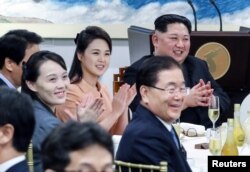What now?
That is the question from the White House in Washington to the Blue House in Seoul — and perhaps also inside the Ryongsong Residence in Pyongyang.
Following the historic handshake here between a U.S. president and a North Korean leader, who inked their names to a document with vague but compelling promises, the question emanating from Sentosa's Capella Hotel was what will actually change on the Korean peninsula?
Moments after the summit between Donald Trump and North Korea's Kim Jong Un concluded, VOA contributor Greta Van Susteren and I spent a few minutes with the U.S. president and his secretary of state, at the Capella.
Trump was elated and within the hour would make a surprising announcement suspending "provocative" joint U.S.-South Korean drills on the Korean peninsula.
"We had a great chemistry," the president, speaking to Van Susteren, said of himself and Kim. "We will do business."
Secretary of State Mike Pompeo told us, "it's a great day."
The president has essentially handed off to Pompeo the hard work of turning a sparse declaration on denuclearization into something truly transformative. Many will question whether Pompeo, who a decade ago was running an oilfield equipment company, is truly the man for the task.
In Pompeo's background, however, are indications of his capabilities: First in his class at the U.S. Military Academy, time served on the House of Representative's intelligence committee, a brief stint as director of the Central Intelligence Agency and two meetings with Kim in Pyongyang. Perhaps he is now as astute as any American official on piecing together the Pyongyang puzzle.
This correspondent — an observer of the Korean peninsula over five decades, resident in Seoul for several years and once given the opportunity to frankly converse for a week (in 2013) in the North with KPA officers — has gleaned some insight into the world's most reclusive state.
Rarely can any collection of a few hundred words adequately encapsulate the geo-political conundrum. It is difficult for an outsider to fathom the deep emotional yearning of Koreans on both sides of the 38th parallel for reunification despite the vast ideological divide.
There is Korean ambivalence about the support from and decades of meddling by powerful outsiders even as there is no denying that the fate of the Korean peninsula greatly depends on leaders and generals in Beijing and Washington.
What astute analysts of the North have realized over the decades is the Kim family dynasty's unwavering belief in its own rectitude at a tragic and brutal cost to its own people. Dooming millions to cannon fodder or starvation is not too high price a pay for regime survival.
Nor has any sacrifice been too great to acquire nuclear weaponry and ballistic missiles — an asymmetrical means to counter the firepower of the Pentagon.
Few intelligence analysts and scholars in the West believe the North Korean leadership will naively negotiate away this advantage. But dangling the prospect could rapidly achieve several of Pyongyang's long-term goals — sanctions relief, a peace treaty with the United States, wider diplomatic recognition, international respect and, most importantly, an insurance policy for future generations of Kim family rule.
The real unknown is whether Kim Jong Un is really the mastermind of all this or has been persuaded to take this path by a particular faction.
What may be most surprising to outsiders is that North Korea's hierarchy is not monolithic. As in any elite society, even one deemed totalitarian, there are differing philosophies, personality feuds and rivals seeking greater power, much as with any historical palace intrigue. This includes hardliners who fear détente, or even the slightest thaw, will crack the monocracy with fatal consequences for themselves.
This we know from high-level defectors, long-time diplomats in Pyongyang, fleeting first-hand observations by journalists such as myself and the rare, reliable intelligence intercepts.
Yet, at this juncture we cannot conclude whether Kim's handshake with Trump indicates a sincere change of heart or is yet another ruse from a regime that has broken every significant agreement it has ever made.
Either way Kim is making a high-stakes wager.
President Trump, the self-described consummate dealmaker, and Pompeo, his novice envoy, express confidence they have correctly sized up Kim as a leader seeking a path to peace and prosperity.
For now, despite the handshake and a signed piece of paper, the allied militaries of the United States and South Korea remain on constant alert to confront a formidable foe they fought to a stalemate and armistice decades ago but one now armed with weapons of mass destruction.
Should there be fresh provocation or miscalculation, hardliners, both in Washington and Pyongyang, may be telling their bosses "I told you so."
VOA White House Bureau Chief Steve Herman was based in Asia from 1990-2016. He made his first reporting trip to the Korea DMZ in 1981.









